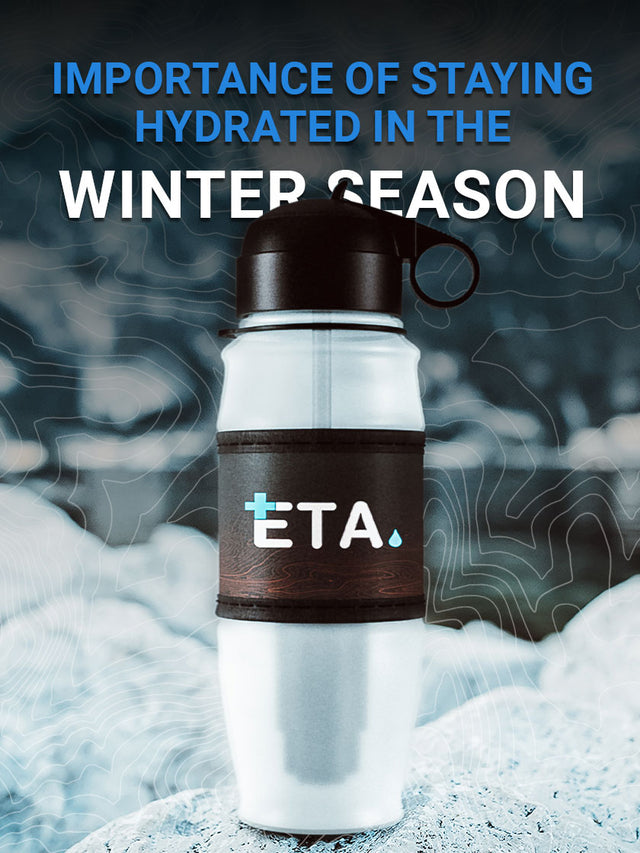
Importance of staying hydrated in the winter season
Throughout the year, drinking enough water is essential. But we often believe that because the weather is warmer in the summer, we should be especially cautious of dehydration. But did you know winter dehydration is real? Compared to other seasons of the year, the amount of humidity in the air is often substantially lower during the winter months, making the air much drier. Additionally, because of heating systems at home the air in our houses is also dry. These variations in indoor and outdoor air quality can raise our risk of dehydration. Water consumption, in particular, drops off throughout the winter even without recognizing it. The truth is that just like hot and sweaty seasons, staying hydrated in the winter is important.

What is winter dehydration?
When your body doesn't have enough fluid to function correctly, dehydration happens. While there are many variables that might determine how much water you require each day, the average adult requires about 100 ounces on a daily basis.
In the same way it is possible to become dehydrated in hot weather, it is also possible to become dehydrated in cold weather. In fact, maintaining hydration in the summer can occasionally be simpler than maintaining hydration in the winter as it is a conscious choice we make. We often forget to consume enough amounts of water owing to the colder temperatures ultimately leading to dehydration without knowing it.
Winter dehydration is less noticeable
Summer heat can cause us to sweat, which makes dehydration much more obvious. Over the years, we’ve also learnt and familiarized ourselves with essential facts like drinking adequate water and rehydrating during summers is important. However, during the colder seasons, sweat quickly converts into water vapor. Additionally, putting on extra layers of clothing can unknowingly cause our bodies to become dehydrated. To guarantee that we are staying hydrated in winter, it is essential to continue drinking water throughout the day.
Some people tend to drink less water in the winter seasons than in the summer because they feel less thirsty when it is cold outside. However, being less thirsty does not equate to being more hydrated. In colder climates, humans typically sweat less. In chilly temperatures, your body still loses moisture, but since there is no sweating to serve as a signal, you might not be aware that you need to rehydrate by drinking water. People may be less inclined to make an effort to stay hydrated during the winter than they are during the summer because they don't always link dehydration and chilly weather.
Staying hydrated in the winter
It's harder to feel your body sweating during the cold weather. And with the efforts we take to reduce the cold temperature the chances of having dehydration are high. That is why maintaining the usual hydration levels of your body is important. Keeping hydrated all winter long can help your body fight off infections and strengthen your immune system. You can remain warmer in the cold by drinking water and staying hydrated. Your body depends on water to help keep a balance in body temperature, so when you're dehydrated, you run the risk of getting cold.
Whether you decide to exercise or not, it is important to be aware of the symptoms and signs of dehydration. The most vulnerable groups to dehydration are young children and the elderly. Our bodies become unbalanced when too much water is lost, and to rehydrate, we typically need a combination of fluids, electrolytes and carbohydrates.
Signs and symptoms to watch out for during dehydration include:
- Extreme thirst
- Decreased urine production
- Dark urine that has persisted for a while
- Dizziness
- Flushed complexion
- Headache or lightheadedness
- Cramps
- Quick or rapid heartbeat
- Muscle pain
- Dry mouth or a dry cough
- Dry skin
- Flushed (red) skin
- Loss of appetite but maybe craving sugar
- High heart rate but low blood pressure

Tips for staying hydrated
Here are a few simple yet important tips to improve your daily water intake during winter.
- Using a reusable water bottle with you and filling it up as needed.
- To change up the flavor of your water, squeeze some fresh fruit in it.
- Drink water instead of other beverages throughout meal and snack times.
- Avoid the intake of sugary beverages like soda and energy drinks.
- Maintain a clear line of sight over water! To remind yourself to keep drinking, keep a water bottle at the place where you work that helps you track consumption.
- Maintain a healthy water intake by eating fruits and vegetables with a high water content. Making half of your plate fruits and veggies is a simple method to add more fluid to your meals.
- Set a reminder for yourself! You can set a phone alert at regular intervals to notify you when it's time to sip some water off your water bottle.
How can ETA assist winter hydration?
Just as important as staying hydrated in the winter is, it is important to look for the quality and the safety of what we drink. That is why we cannot emphasize enough on the importance of looking for a system that combines filtration along with portability and trackability to guarantee that you have access to the purest drinking water available to rehydrate or maintain hydration levels.
The ground-breaking ETA Alkaline Water Filter Bottle uses simple but unique IAMF technology to filter out radioactive elements as well as the other three types of water contaminants. It has been tested in over 30 countries and in over 350 laboratories, making it the most extensively tested and trusted water filter bottle available for extreme filtration of water from any source. Additionally, it filters water while preserving the essential minerals and instantly alkalizes water to a pH of 9.5 with a 30 day shelf life. Can you picture having a filter-equipped water bottle with all of these features? In addition, it comes with a host of other benefits like it being lightweight to make carrying it around easy and trackability as you can measure how many times you’ve consumed 28 ounces of water during the day by refilling your ETA.

When you take your ETA along in the winter seasons, you are enhancing your health, while saving money, and staying healthy and hydrated throughout your cold weather. Just like summer, it is very important to balance the body temperature while preventing dehydration effects during the winter season. With the temperature changes in the environment, the human body tends to seek more water even though we don’t sweat or feel thirst much. That is why staying hydrated in the winter season is so crucial. Therefore, setting yourself up with the best filtered water bottle for winter or even for any other season is the easiest and safest way to stay hydrated while enjoying the chills of the winter.
